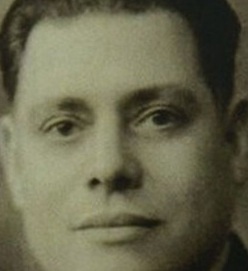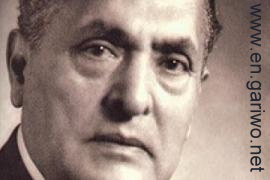Nick
Catalano is a TV writer/producer and Professor of Literature
and Music at Pace University. He reviews books and music for
several journals and is the author of Clifford
Brown: The Life and Art of the Legendary Jazz Trumpeter,
New York
Nights: Performing, Producing and Writing in Gotham
and A
New Yorker at Sea. His latest book, Tales
of a Hamptons Sailor, is now available. For Nick's
reviews, visit his website: www.nickcatalano.net
In
an effort to reawaken memories of The Holocaust and to acquaint
young readers with its scope, in past issues I have written
several essays on the subject (c.f. the list following this
piece). It is astounding that 75 years after WW II, the stories
keep pouring out from unlikely areas and sources. A few months
back I reviewed a film --
Above the Drowning Sea --
that recounted the rescue to Shanghai of some 20,000 Jews by
a Chinaman. While researching some other press releases I recently
came across similar stories relating the heroism of a Mexican
and a Salvadoran – Jose Castellanos of El Salvador and
Gilberto Saldivar of Mexico.
 Born
in 1893 in El Salvador, Jose Castellanos entered the military
eventually rising to the rank of Colonel, and becoming the Second
Chief of the General Staff of the Salvadoran army. According
to Castellanos’ grandsons Alvaro and Boris Castellanos,
who have researched their grandfather’s story and made
a documentary about him titled The Rescue, he was posted abroad
in 1938 because he expressed anti-fascist feelings in opposing
El Salvador’s autocratic tyrant Gen. Maximiliano Martinez.
Castellanos served as Salvadorian Consul General in England
(1937), in Germany (1938), and in Geneva (1941-1945).
Born
in 1893 in El Salvador, Jose Castellanos entered the military
eventually rising to the rank of Colonel, and becoming the Second
Chief of the General Staff of the Salvadoran army. According
to Castellanos’ grandsons Alvaro and Boris Castellanos,
who have researched their grandfather’s story and made
a documentary about him titled The Rescue, he was posted abroad
in 1938 because he expressed anti-fascist feelings in opposing
El Salvador’s autocratic tyrant Gen. Maximiliano Martinez.
Castellanos served as Salvadorian Consul General in England
(1937), in Germany (1938), and in Geneva (1941-1945).
Ironically,
Castellanos’ European posting by the Salvadorian fascist
government would eventually save the lives of at least 25,000
Jews.
After
witnessing Kristallnacht in 1938 and the movement of 30,000
Jews to concentration camps, Castellanos petitioned his government
to issue visas to German Jews. Word came from El Salvador that
he was forbidden to help. When he was posted to Geneva he decided
to disobey orders. He initially helped a Hungarian Jewish businessman
named Gyorgy Mandl by changing his name to the
latinate George Mandel-Mantello and saving his family from deportation
by naming him El Salvador’s First Secretary of the Geneva
Consulate, a fictitious post and title that Col. Castellanos
made up. Soon, he and his ‘First Secretary’ began
issuing Salvadoran passports and visas to Jews all over Europe.
As
the war progressed the duo realized that they couldn’t
issue visas fast enough to save the many desperate Jews whose
lives were in danger so they secretly distributed over 13,000
certificates of Salvadoran citizenship, each document protecting
an entire family. Thus, thousands of European Jews with no connection
to El Salvador suddenly became citizens of a tiny Central American
country. Citizenship allowed the Jews to receive protection
from the International Red Cross that guaranteed the rights
of citizens of neutral countries during the war.
Castellanos
amplified his life-saving efforts by enlisting help from Carl
Lutz a Swiss Vice-Consul in Hungary thus frustrating Gestapo
attempts there. It is estimated that his heroic efforts saved
the lives of some 40,000 Jews.
After
the war, Castellanos retired and lived a quiet life rarely talking
about his war-time role. Were it not for a short radio interview,
a brief reference by writer
Leon Uris, and recent efforts by his grandchildren his heroism
would have gone unnoticed. He died in I977.
 Born
in 1892, Gilberto Bosques Saldivar was a militant in the Mexican
revolution, and a leftist legislator who eventually became a
career diplomat. He served as Consul General to France (1939-1941).
Fleeing the German occupation of Paris in May 1940, Saldivar
was instructed by his government to set up a consulate in Vichy,
France and he began to operate in Marseilles. Once the Nazis
turned over control of governance to the Vichy government, Saldivar
saw openings in this ersatz federation and began to help the
oppressed. Immediately, he directed consular employees to issue
visas to anybody who wanted to flee to Mexico. Under his auspices
visas were issued to approximately 40,000 people mostly Jews
and Spaniards. The Spaniards rescued were refugees from Francoist
Spain after the conclusion of the Spanish Civil War in April
1939. The Jews came from all over Europe seeking refuge anywhere
they could and some managed to secure temporary safety in southern
France. Saldivar actually rented a castle and a summer holiday
camp in Marseilles to house refugees under the protection of
what he maintained was Mexican territory under international
law.
Born
in 1892, Gilberto Bosques Saldivar was a militant in the Mexican
revolution, and a leftist legislator who eventually became a
career diplomat. He served as Consul General to France (1939-1941).
Fleeing the German occupation of Paris in May 1940, Saldivar
was instructed by his government to set up a consulate in Vichy,
France and he began to operate in Marseilles. Once the Nazis
turned over control of governance to the Vichy government, Saldivar
saw openings in this ersatz federation and began to help the
oppressed. Immediately, he directed consular employees to issue
visas to anybody who wanted to flee to Mexico. Under his auspices
visas were issued to approximately 40,000 people mostly Jews
and Spaniards. The Spaniards rescued were refugees from Francoist
Spain after the conclusion of the Spanish Civil War in April
1939. The Jews came from all over Europe seeking refuge anywhere
they could and some managed to secure temporary safety in southern
France. Saldivar actually rented a castle and a summer holiday
camp in Marseilles to house refugees under the protection of
what he maintained was Mexican territory under international
law.
In
1943, Saldivar, his family (wife and three children), and 40
consular staff members were arrested by the Gestapo and imprisoned
in Germany. He was released only after the Mexican government
arranged a prisoner exchange that freed the Saldivars in return
for German prisoners held in Mexico. After the war Saldivar
served as Mexican ambassador to Portugal, Finland, Sweden and
Cuba. His heroic efforts in rescuing some 40,000 people from
Fascist extermination went unrecognized even among specialists
in the history of Jewish rescuers until recently. There do exist
some brief film clips of Salvidar’s activities on CNN
Mexico and other YouTube sources.
The
summaries above are only brief sketches of the scope of the
efforts of these Latin heroes. It is amazing how so many stories
of heroic virtue such as these lie buried while we continually
see documentary television networks constantly showing miles
of footage of Nazi vice and Hitler’s evil.
This
pattern of course immediately calls to mind the age-old question
why in the story-telling world is evil more popular than good.
Thinkers from Aristotle to Freud and beyond have probed the
depths of human consciousness for answers with complex and mostly
unsatisfying theories. Stories of goodness, according to W.H.
Auden are simply boring. He wryly remarked the Ten Commandments
consist in observing human behaviour and then inserting a “not.”